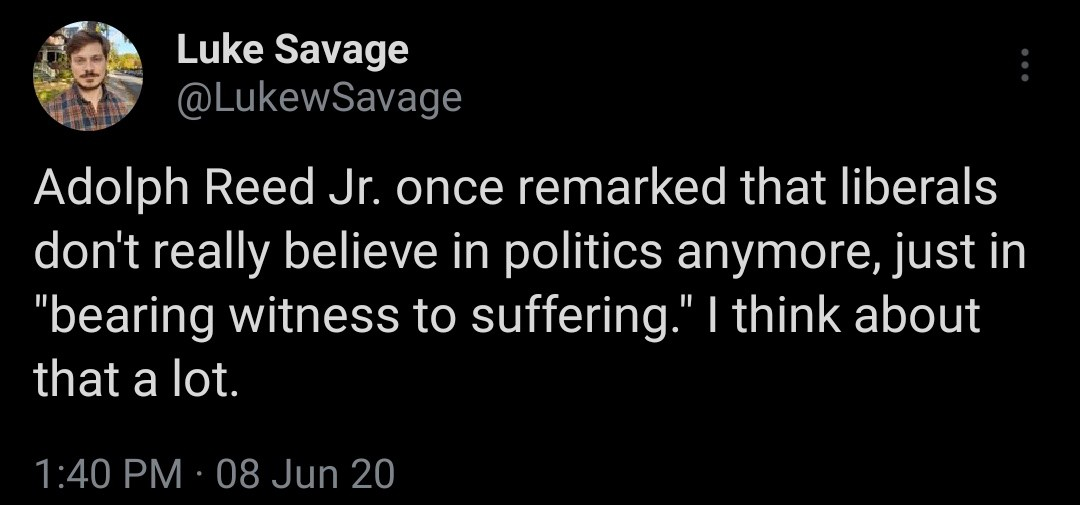this post was submitted on 26 Aug 2024
114 points (99.1% liked)
GenZedong
4300 readers
227 users here now
This is a Dengist community in favor of Bashar al-Assad with no information that can lead to the arrest of Hillary Clinton, our fellow liberal and queen. This community is not ironic. We are Marxists-Leninists.
This community is for posts about Marxism and geopolitics (including shitposts to some extent). Serious posts can be posted here or in /c/GenZhou. Reactionary or ultra-leftist cringe posts belong in /c/shitreactionariessay or /c/shitultrassay respectively.
We have a Matrix homeserver and a Matrix space. See this thread for more information. If you believe the server may be down, check the status on status.elara.ws.
Rules:
- No bigotry, anti-communism, pro-imperialism or ultra-leftism (anti-AES)
- We support indigenous liberation as the primary contradiction in settler colonies like the US, Canada, Australia, New Zealand and Israel
- If you post an archived link (excluding archive.org), include the URL of the original article as well
- Unless it's an obvious shitpost, include relevant sources
- For articles behind paywalls, try to include the text in the post
- Mark all posts containing NSFW images as NSFW (including things like Nazi imagery)
founded 4 years ago
MODERATORS
you are viewing a single comment's thread
view the rest of the comments
view the rest of the comments

Honestly, reminds me of catholicism vibes when I think about it. And to be clear, I mean whatever brand of catholicism I grew up with in the US, I can't speak for every form of it across the world. But anyway, the reason I think of it is because of the mindset that can surround penance and confession and the like. Notably (to my knowledge/experience with it) confession is fundamentally centered around penance and forgiveness, rather than around solving the problem. That's not to say a priest would never give advice if you asked, but the structure of it is like that. When I used to be catholic and would go, it was never like, "Okay, what are you going to do to act differently?" It was like, "For your penance, say five hail marys" or whatever.
There might be theologians who would disagree with me, but to me it's this thing kind of like, "As long as I feel pain by taking note of your pain, I in some way make up for your suffering." When the reality is that if someone is in a burning building, they don't want you to cry and sob and wear a hair shirt and give up sweets for a month, they want you to get them out of that building ASAP before they die. They don't care if you are depressed or ecstatic doing it, they just want the help.
And I mean, there are cases, like with Palestine, where helping put a spotlight on it is something, however small it can seem. But Palestinian people don't need you to spread the word because they need you to secondhand suffer for them. They need you to spread the word in order to resist imperialist narratives and stay alive more effectively. Among other reasons like building pressure for boycotting and so on.
Anywho, this is my scattered attempt at unraveling where some of this comes from.
"God is dead, for we have killed him."
This is exactly what Nietzche was referring to. Because religion shifts responsibility onto itself, religious followers don't actually address their problems. Nietzche was being literal and metaphorical. Literal as is "the death of Christ at the hands of mortals" and metaphorical in the way you describe.
Nietzche thought this is why religious people often become nihilistic in both thoughts and actions. Because they are no longer to blame for others' suffering, the religious person (Christians in particular) adopts a worldview that nothing in life matters because it's all just preparation for the afterlife. It becomes easy for them to witness suffering and take no action because of it.
This has bled over into secular thinking, as well. Even when non-believers and apostates don't have beliefs in religion, their ways of thinking have remained the same. This is especially rampant among capitalists who think the system is perfect. The system takes away blame and shifts it onto the disenfranchised ("Choose to be homeless," bootstraps, welfare queens, and so on).
You're not the first to make the connection
And as this essay points out, it applies just as well to the western "left" as to "progressive" liberals
Great read, bookmarking this for future reference.
I think you might be on to something here.
Thoughts and prayers
I think this is an excellent and accurate analysis, I have similar thoughts.